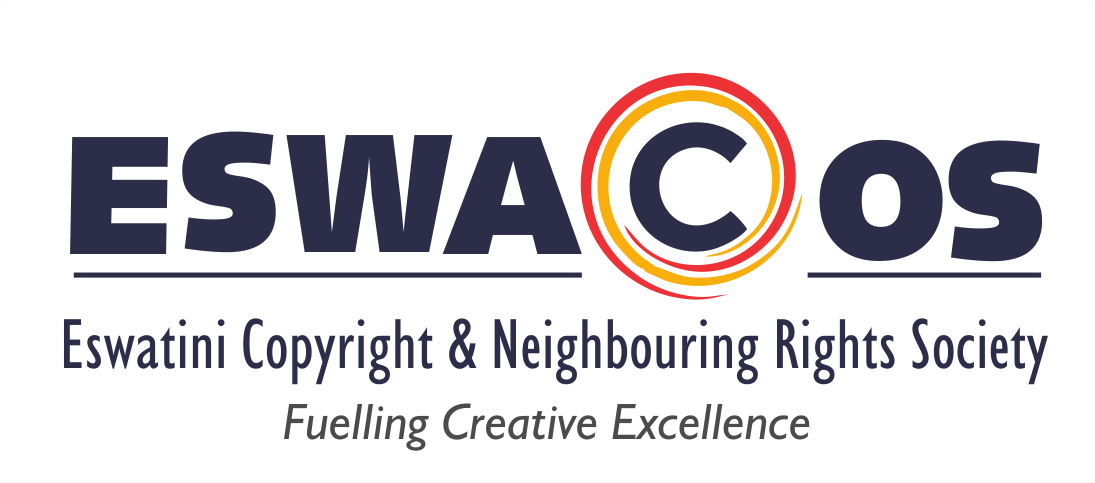Frequently Asked Questions
Is there an annual membership fee I must pay?
Membership with ESWACOS is currently free. You can register for Membership here.
Do my copyrighted works have to be published before I can receive royalties?
No, eligible works registered with ESWACOS can receive royalties if they are being used, regardless of prior publication.
How do I register new works?
Complete the Application for Registration of Copyright and Neighbouring Rights Form and submit it to our offices, via email on documentation@eswacos.org.sz, or upload it online for every new work created. You can register online here.
How can I become a member?
To become a member, send the completed and signed Membership Application Form (Individual or Legal Entity), Deed of Assignment, and Application for Registration of Copyright and Neighbouring Rights Form, along with supporting documents, to documentation@eswacos.org.sz. You can also contact +268 76024199 or visit our offices at the Embassy House Building, Gwamile Street in Mbabane. You can also register online here.
Membership Requirements for Individuals
- Evidence of the work produced in material form.
- A copy of national identity card or copy of birth certificate if less than 16 years (should be accompanied by a parent or guardian) or copy of valid passport and residence permit for foreign nationals.
- Copies of signed agreements for works of joint ownership (such as a split sheet for musical works), an assignment for commissioned works, works made-for-hire in which ownership of rights have been transferred or any other document that assists in proving or supporting your claim for copyright ownership of the work.
- Certified copy of a Death Certificate from the Ministry of Home Affairs and a letter from Master’s Office confirming the applicant as the beneficiary of the estate, if applying on behalf of a deceased person.
- Stamped Bank letter or confirmation letter from any licensed payment service providers for the applicant / beneficiary.
Membership Requirements for Legal Entities (Publishers and Record Labels)
- A certified copy of certificate of incorporation from Registrar of Companies.
- Copy of Form J.
- Proof of residence and certified copy of IDs for director/s.
- Stamped Bank letter, or confirmation letter from any licensed payment service providers in Eswatini.
- Proof of business address for the company.
- Copies of signed agreements for works being registered or any other document that assists in proving or supporting your claim for copyright ownership of the work.
- In case a company is applying on behalf of a deceased person, certified copy of a Death Certificate from the Ministry of Home Affairs and a letter from the beneficiary/s of the estate.
- Evidence of the work produced in material form.
Which Works Cannot Be Registered with ESWACOS?
The following works shall not be eligible for registration with ESWACOS, as the Copyright and Neighbouring Rights Act of 2018, in Section 4, does not extend protection to the following:
- Ideas, procedures, systems, methods of operation, concepts, principles, discoveries.
- Facts or figures, even if they are explained and embodied in a work.
- News of the day that are mere items of press information.
- Speeches of a political nature.
- Speeches delivered in the course of legal proceedings.
- Official texts of enactments.
- Official texts of Bills prepared for presentation in Parliament.
- Official records of judicial proceedings and decisions.
- Notices, advertisements and other material published in the Gazette.
- Official texts of international conventions, treaties and agreements to which Eswatini is a party.
- Entries in, and documents that form part of, any register which is kept in terms of an enactment and is open to public inspection.
- Such other documents of a public nature as may be prescribed.
- A broadcast which infringes, or to the extent that it infringes, the copyright in another broadcast or in a cable program.
- A sound recording or film which is, or to the extent that it is, a copy of a previous sound recording or film.
How much does a license cost?
The fee depends on factors like the type of usage (reprography, public performance or communication to the public), the volume of usage (capacity of events, size of premise, number of copies made), and frequency of usage. ESWACOS uses a tariff schedule approved by the Copyright Office to calculate the license fees.
What happens if I use music without a license?
According to Section 40 of the Copyright and Neighbouring Right Act No.4 of 2018, playing music without a license/owner’s authorization constitutes **copyright infringement** which has legal implications.
Where do the license fees go?
License fees are collected and distributed to the rights holders like authors, performers and producers according to the usage of their work. A portion of license fees is deposited into the **Creative Industries Development Fund** which aims to provide support and advance the creative sector in Eswatini.
Why do I need a license when I have paid a streaming subscription or the performing artist?
Paying a performance fee only covers services rendered by the performer and does not compensate the other rights holders such as authors and producers. Streaming service terms explicitly restrict use to personal, non-commercial use in their terms of service. This means one cannot broadcast or play music from a streaming service publicly or for business purposes.
